AISSQ 2024
Topics
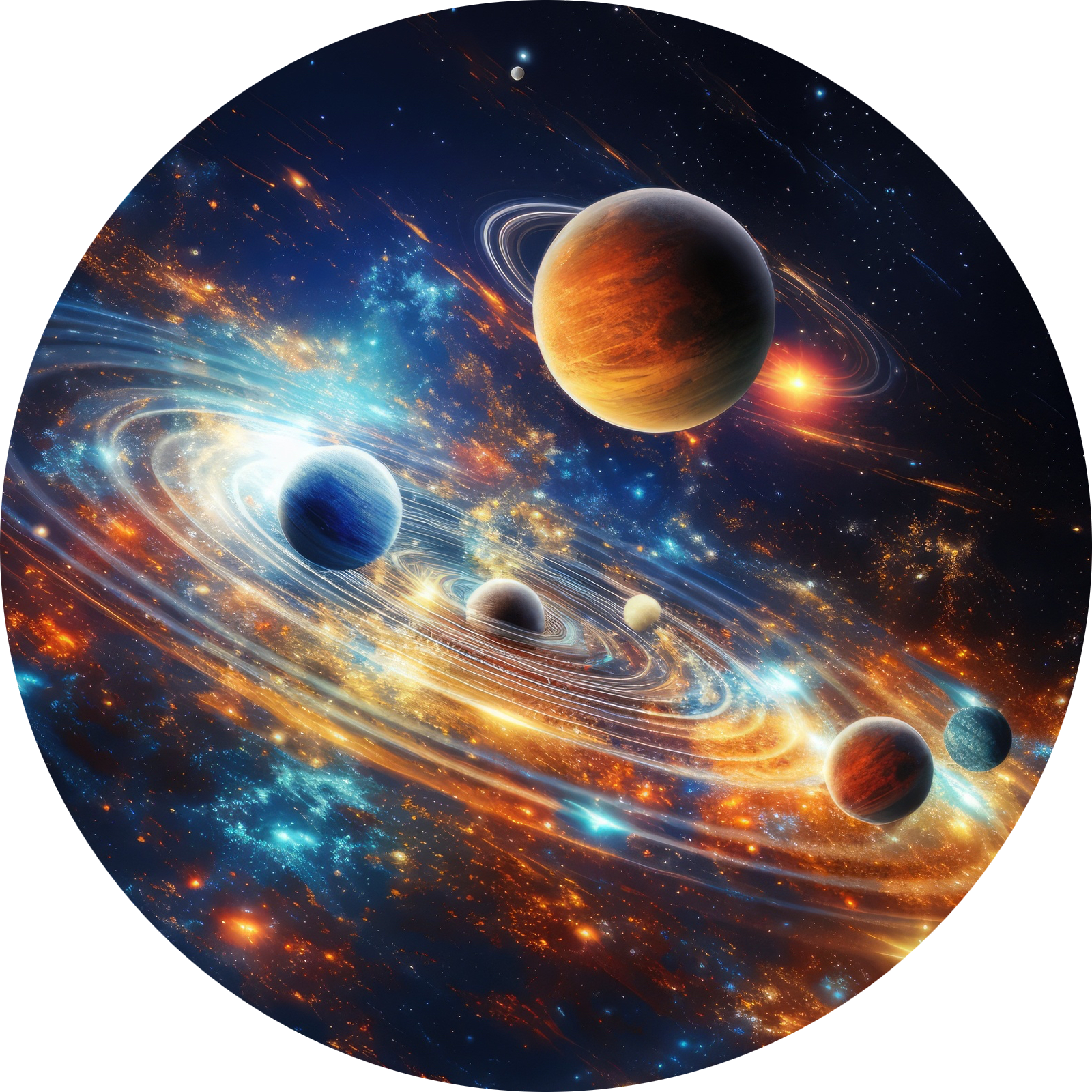
Physics, Cosmology & Beyond
Physics, Cosmology & Beyond explores the fundamental nature of the universe, from the dynamics of quantum particles to the vast expanse of space-time, black-holes, multi-verse, etc examining the foundations, recent trends, boundaries and way beyond for getting the unified theory of physical reality. Together, physics and cosmology push the limits of human knowledge, seeking to understand not only the material universe but also the deeper, often abstract questions of existence.
In our scientific advancement we witnessed many foundational questions such as; What are the universal physical laws governing the working of nature? Is our universe finely tuned? What are fundamental physical constants indicating? What is the act of observation and role of observer in quantum mechanics? Does the Heisenberg uncertainty principle limit our world view? Is matter fundamental or information fundamental? Is our universe ever expanding? What is the role of consciousness in physics and vice versa? Big Bang vs Multivese vs String theory? Black hole information paradox?, and many others.
In this conference, discussions would be invoked around a few of the aforementioned questions enhancing our understanding of physics, & cosmology.
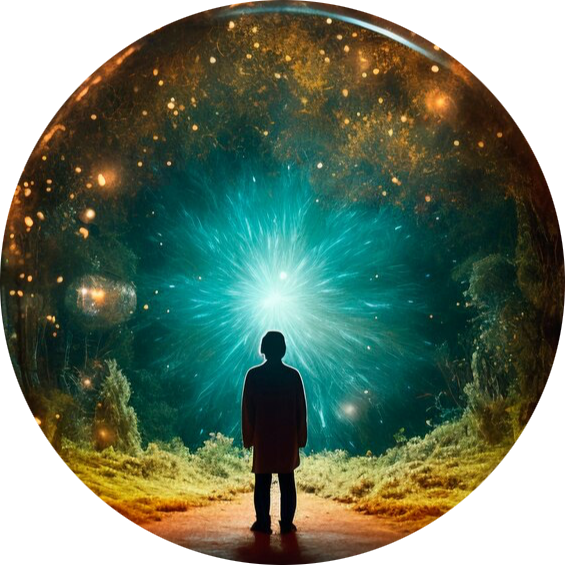
Life - Origin, Meaning & Purpose
Origin of Life
The origin of life is a complex topic that intertwines biology, chemistry, and philosophy. Scientifically, life is believed to have originated around 3.5 billion years ago, evolving from simple organic compounds through processes like abiogenesis. Various theories, including the primordial soup hypothesis and hydrothermal vent hypothesis, explore how the first living organisms emerged. Theories like abiogenesis explore how life arose from simple organic compounds on early Earth, showcasing the remarkable processes that led to life’s complexity.
While science has made significant strides, there are still mysteries surrounding the transition from non-life to life, inviting further exploration and inquiry. Spiritual perspectives celebrate the origin of life as a manifestation of universal consciousness, highlighting our interconnectedness and the profound purpose that enriches our existence.
Meaning and Purpose of Life
Advancements in Science and technology provide valuable insights into the meaning and purpose of life through evolutionary biology, emphasizing survival and reproduction while recognizing the subjective nature of individual experiences. Although science excels at describing mechanisms, it encourages philosophical inquiry into universal meaning and intrinsic purpose, fostering deeper contemplation.
Spirituality offers profound insights into meaning and purpose, linking them to personal growth, compassion, and a connection to a higher calling. This perspective inspires ethical living and fulfillment, guiding individuals toward a meaningful existence.
The exploration of life’s origin, meaning, and purpose through scientific lenses reveals exciting opportunities for understanding. While science provides essential insights, it also opens the door to deeper existential questions. Spiritual understanding enriches this exploration by emphasizing interconnectedness and purpose, promoting a holistic view of existence that inspires individuals in their pursuit of meaning and fulfillment. This topic encourages introspection and dialogue, making it a central theme in human existence.
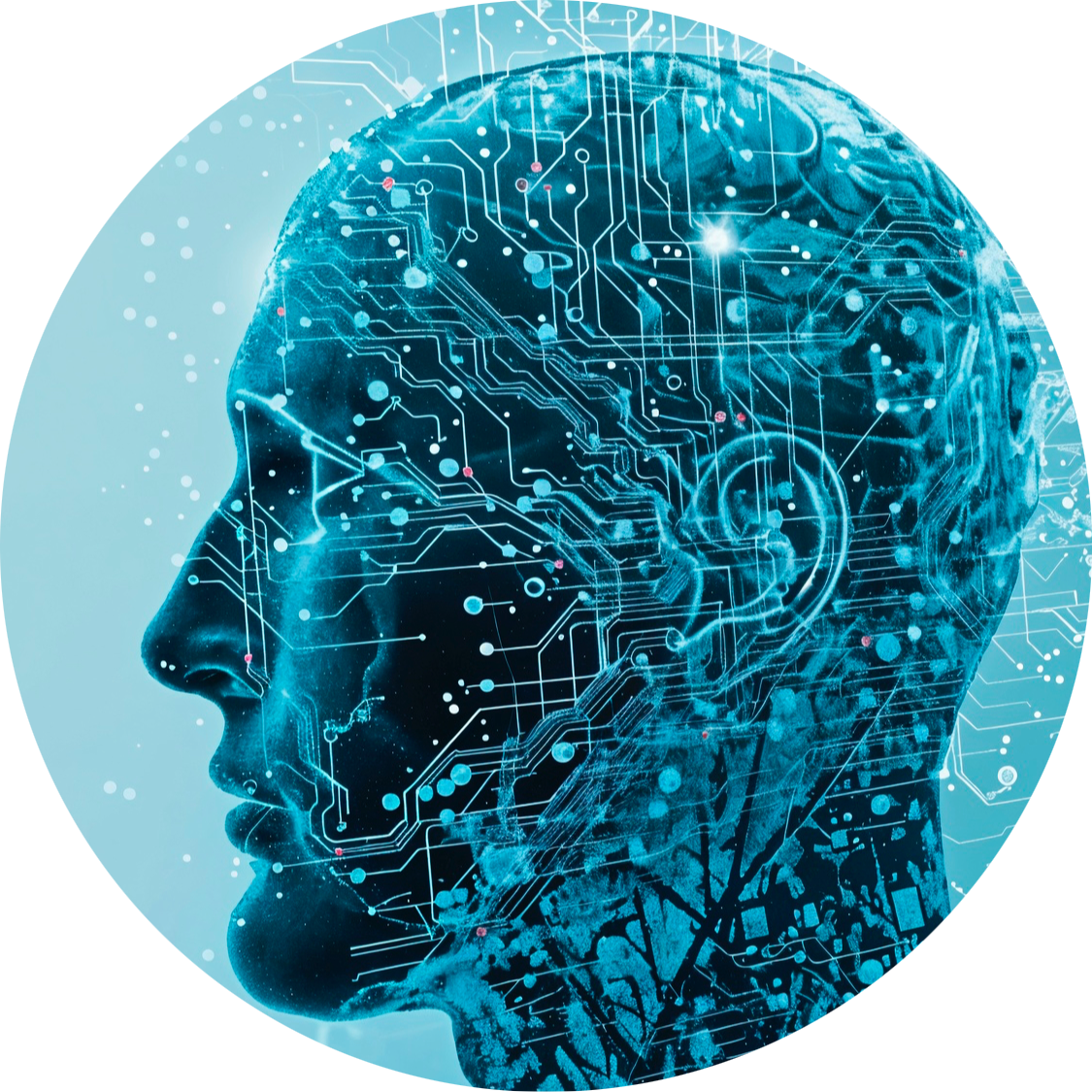
Artificial Intelligence & Consciousness
Artificial Intelligence (AI) & Consciousness are two interconnected yet distinct fields that raise profound questions about the nature of intelligence, awareness, and the future of technology.
- Artificial Intelligence refers to machines or systems designed to simulate human cognitive functions like learning, reasoning, problem-solving, and perception. AI systems, especially through machine learning and neural networks, can process vast amounts of data, recognize patterns, and perform tasks typically requiring human intelligence.
- Consciousness, in contrast, refers to the subjective experience of awareness, thoughts, and emotions. It is the quality that enables beings to experience the world and themselves. While consciousness is still not fully understood, it is central to discussions about self learning, thinking, creativity, mind, self-awareness, and free will.
The intersection of AI and consciousness raises several scientific questions delving into philosophical roots:
- Can machines develop consciousness, or is it unique to biological organisms?
- What defines consciousness, and how can it be measured or replicated in machines?
- If AI becomes advanced enough, could it exhibit forms of self-awareness or subjective experience?
While AI can simulate intelligent behavior, there is no clear evidence or consensus that it can achieve true consciousness. This topic remains a major frontier in both AI research and consciousness, as we explore the limits of machine intelligence and the nature of human awareness.

Mathematics, Reality & Spirituality
Mathematics, Reality & Spirituality explore the intersection of abstract reasoning, the nature of existence, and deeper philosophical or spiritual insights. Mathematics is often described as the language of the universe, providing the framework through which we understand physical & biological phenomena. From the laws of motion to quantum mechanics, mathematical equations articulate the relationships and behaviors of physical systems. Its precise structures allow scientists to formulate theories and make predictions. Patterns and symmetries are prevalent in nature, from the arrangement of galaxies to the structure of DNA. Mathematics elegantly captures these patterns, leading to the idea that the universe is fundamentally mathematical.
However, the question arises: Is mathematics a discovery of inherent truths about the universe, or is it a construct of human thought?. Understanding whether mathematics exists independently of human cognition or is merely a tool for description is a fundamental issue that impacts how we interpret reality. Patterns, symmetries, and fractals found in nature illustrate the underlying order of the universe, suggesting a profound unity that transcends our rational, mathematical understanding. The relationship between mathematics and spirituality invites exploration into how mathematical truths may reflect deeper realities with intricate order & symmetry, leading us to the profound spiritual axioms of the Creator. And it will also emphasize the understanding of the role of consciousness in formulating mathematical concepts & theories, in understanding the reality.
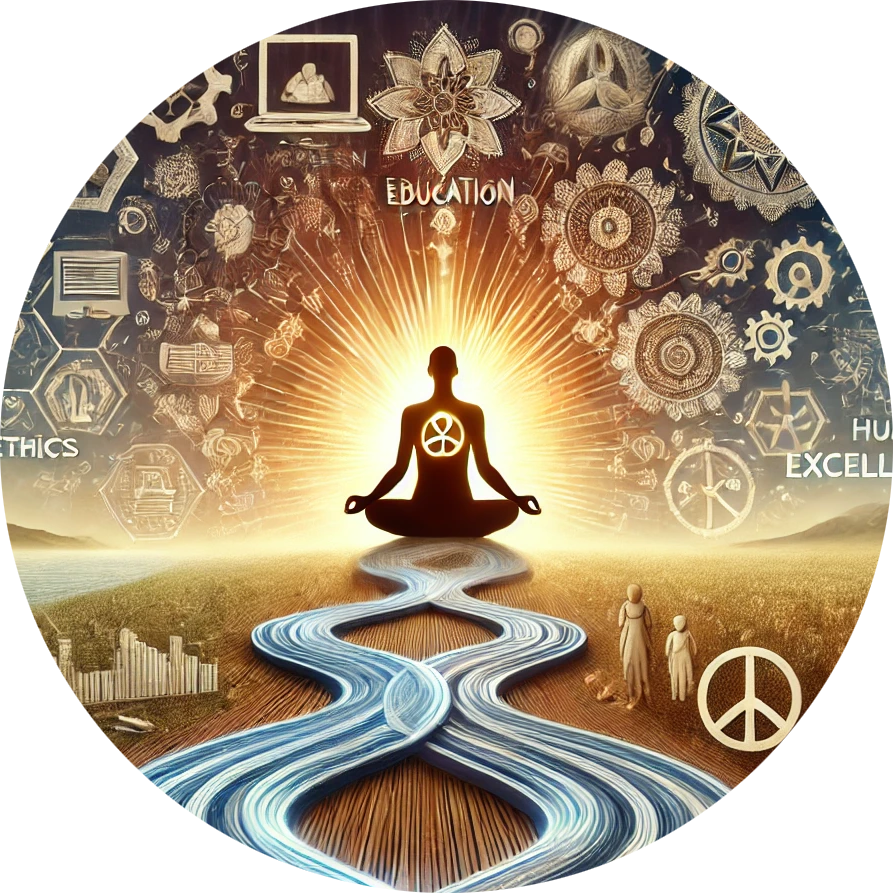
Holistic Education & Human Excellence
Holistic education and human excellence are significantly enhanced by the integration of both modern and spiritual education. Together, they create a well-rounded framework that nurtures individuals on multiple levels. Here’s how each plays a crucial role:
Modern Education
Critical Thinking and Problem Solving: Modern education emphasizes analytical skills, fostering critical thinking and problem-solving abilities. This equips individuals to navigate complex challenges and make informed decisions.
Technological Proficiency: In today’s digital world, modern education integrates technology into learning, preparing individuals for the demands of the workforce and enabling them to harness digital tools for creativity and innovation.
Diverse Perspectives: Modern education promotes exposure to various cultures, ideas, and disciplines. This diversity fosters open-mindedness and the ability to appreciate different viewpoints, which is essential for effective collaboration and social interaction.
Social and Emotional Learning: Many modern educational frameworks include social-emotional learning (SEL) programs that help students develop skills like empathy, resilience, and effective communication, contributing to overall personal excellence.
Lifelong Learning: Emphasizing adaptability and continuous learning, modern education prepares individuals to thrive in an ever-changing world, instilling a mindset of curiosity and growth.
Spiritual Education
Ethical Framework: Spiritual education provides a foundation of values and ethics, guiding individuals in making morally sound decisions. This is crucial for developing integrity and character—key components of human excellence.
Inner Peace and Mindfulness: Spiritual practices promote mindfulness and inner peace, enhancing emotional well-being and helping individuals manage stress. This mental clarity supports focused learning and personal growth.
Sense of Purpose: Spiritual education fosters a deeper understanding of life’s meaning and purpose, motivating individuals to pursue their passions and contribute positively to society.
Community and Connection: Spiritual teachings often emphasize interconnectedness and the importance of community. This cultivates a sense of belonging and encourages individuals to engage in acts of service and social responsibility.
Holistic Well-Being: By addressing mental, emotional, and spiritual dimensions, spiritual education promotes overall well-being, enabling individuals to achieve balance in their lives and contribute to their communities more effectively.
Conclusion
The integration of modern and spiritual education within the framework of holistic education creates a comprehensive approach to human excellence. Modern education equips individuals with essential skills and knowledge for navigating the complexities of the contemporary world, while spiritual education nurtures the inner dimensions of character, ethics, and purpose.
Together, they foster well-rounded individuals who are not only competent in their fields but also compassionate, ethical, and socially responsible. This synergy ultimately leads to a generation of leaders and contributors who can navigate life’s challenges with resilience and integrity, driving positive change in society.
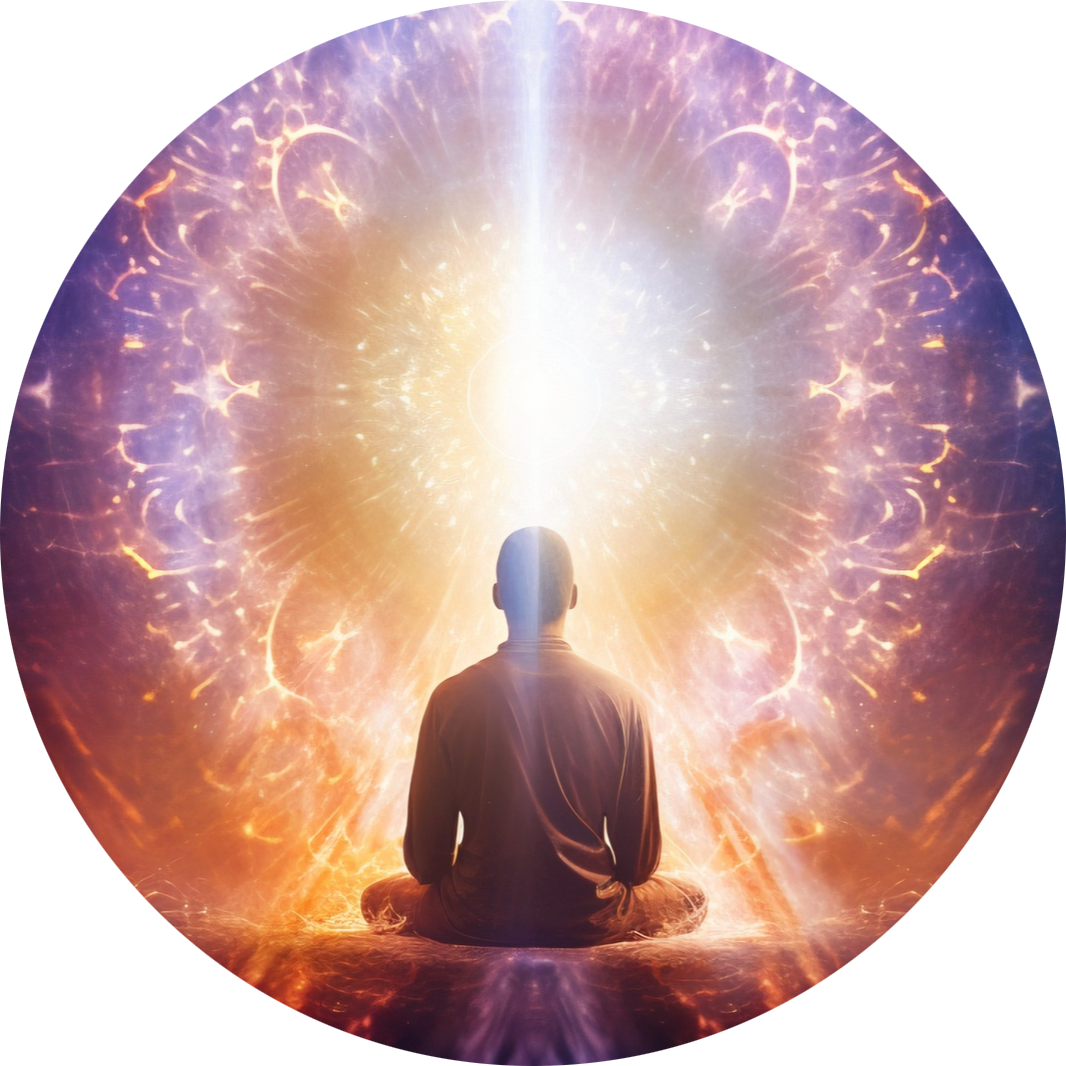
Spirituality & Health
Spirituality & Health are closely linked, nurturing the wellbeing; as per the recent research findings. Health, as defined by the World Health Organization, is a dynamic state of complete physical, mental, spiritual, and social well-being, and not merely the absence of disease or infirmity. This holistic perspective recognizes that true health transcends physical conditions and encompasses emotional stability, spiritual fulfillment, robust social connections, and finding meaning and purpose of life.
Are health and spirituality intertwined? How to achieve holistic well being? What is the role of Spirituality in achieving inner peace and tranquility? What does the current scientific research say about the effect of spiritual practices on health? Does our current understanding of “Life” need to be revisited with the recent research findings?
Spirituality & Health Session will try to address the aforementioned questions and present the recent research emphasizing the necessity of Spiritual Practices for holistic wellbeing.

Vedanta & Science
Vedanta & Science explore different aspects of reality but can complement each other in their pursuit of truth and understanding.
Vedanta is a spiritual philosophy rooted in the ancient Indian texts, particularly the Upanishads. It emphasizes that reality is multi-layered, encompassing physical, mental, and spiritual dimensions. The material world is seen as a temporary manifestation of a deeper, unified reality. Foundational Concepts of reality such as consciousness, action, time, self/spirit soul, nature, creation, and creator are the integral part of vedanta giving holistic picture of reality, emphasizes the unity of all existence, the interconnectedness of life, and the realization of the self (Atman) as identical with the ultimate reality (Brahman). Vedanta seeks to answer fundamental questions about consciousness, existence, and the nature of the universe.
Science, on the other hand, is a method of understanding the physical dimension of the world through observation, experimentation, and reasoning. It focuses on discovering measurable and empirical truths about the universe, such as the laws of physics, biology, and chemistry.
The relationship between Vedanta and science lies in their shared search for knowledge and truth. Some researchers and thinkers propose that Vedanta and science can complement each other. For instance, concepts from Vedanta regarding consciousness and holistic health may find resonance in fields like quantum physics or integrative medicine. However, they differ in their methods—science relies on external observation, while Vedanta emphasizes inner experience and self-realization. Both offer valuable insights into the nature of reality and existence. Bridging these perspectives can foster a more comprehensive understanding of the universe, enriching our knowledge and practices in various fields, from health and wellness to the nature of consciousness itself. Embracing the strengths of both paradigms can lead to a more holistic approach to understanding life and the cosmos.
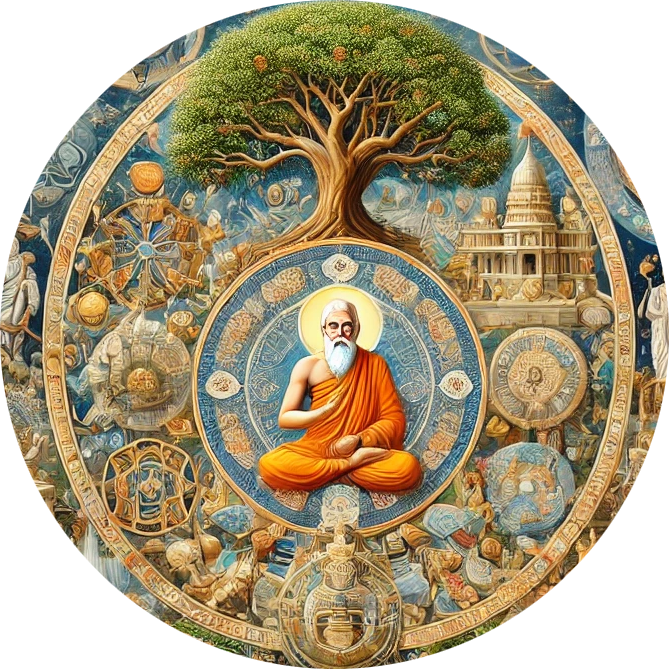
Indian Knowledge System (IKS)
The Indian Knowledge System (IKS) encompasses a wide range of traditional knowledge, practices, and philosophies that have evolved over millennia in India., spanning various fields such as science, mathematics, medicine, arts, and spirituality. Rooted in ancient texts like the Vedas, Upanishads, Puranas, and other classical works, it offers holistic and interdisciplinary approaches to understanding life, nature, cosmos and their origin & interconnectedness.
- Holistic Health
Practices like Ayurveda and yoga promote integrated physical, mental, and spiritual well-being, emphasizing preventive care. - Sustainability
IKS advocates for ecological balance and sustainable practices, offering valuable insights for addressing environmental challenges. - Philosophical Insights
Indian philosophies explore fundamental questions about existence and morality, contributing to ethical discussions and personal well-being. - Cultural Heritage
Rich artistic and cultural expressions foster diversity and support traditional crafts, enriching global culture. - Knowledge Integration
Combining traditional knowledge with modern science can lead to innovative solutions in health and technology. - Educational Approaches
Traditional methods emphasize critical thinking and experiential learning, informing holistic and inclusive educational practices. - Global Relevance
IKS provides insights into mindfulness and interconnectedness, fostering a compassionate worldview.
Indian Knowledge Systems are essential for holistic health, sustainability, philosophical exploration, and cultural richness, offering valuable perspectives for contemporary challenges integrating science with spirituality.
